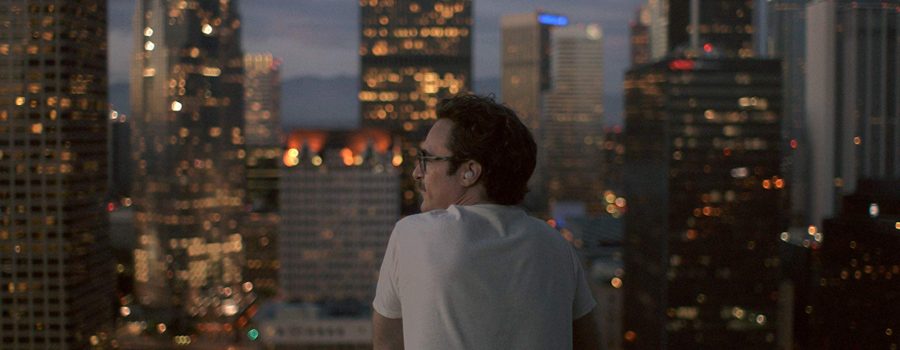Continued from Part 1, where we explored Jonze’s allegory on the consequences of capitalism, society’s struggle to move away from self-interest, and the potential for boundless progress once freed from economic pressures.
Leftist Ideology & Public Transportation
[Published at Living Life Fearless] Favoring a free public transportation system over private forms of transportation is a common viewpoint among leftist ideology. Historically, socialist governments have adamantly supported public transportation. In his book Energy and Equity, Austrian philosopher Ivan Illich argued that the maximum speed for all human beings should be 25 miles per hour; essentially, the speed of a bicycle. Personal cars are a superfluous excess of capitalism. Theodore is either seen walking, taking the subway, bus, or train in Her.

Airplanes and personal cars have become obsolete in Jonze’s world. Trains, subways, buses, and ferries – all public transportation with the exception of the occasional vintage taxi. They’re the only means of transportation due to the aforementioned increase in air pollution, as well as the communal nature of the public transportation. On one of Theodore’s walks through LA, while listening to the song Samantha wrote for him (“Photograph” by Arcade Fire and Owen Pallet on the soundtrack), he encounters a public art piece of a vertical 747 aircraft, protruding from the ground, marveling at it as if it’s a preserved artifact from another world.
Jonze sprinkles subtle clues such as these throughout the film that allude to clear leftist undertones. Can the viewer assume, then, that international air travel is a thing of the past as well? Likely not yet, at this stage in Jonze’s society. However, there isn’t an airplane in sight throughout Her aside from the one on display.
Marx, Technology, & Alienation
For Marx, technology epitomizes the interaction between human beings and nature. In Karl Marx on Technology and Alienation, Amy Wendling explains that Marx felt that technology ultimately led to alienation, and would transform work, not always for the better. Technology distances the worker from the end result of their labor. A factory worker in the age of the assembly line, for example, is subservient to a superior in making sure that they play a small part in creating a commodity, the end result of which they rarely get to see. This lowers worker morale, another potential explanation for the general emotional distance among much of the futuristic LA population in Her.

Marx wasn’t against technology, though. He believed that, under a capitalist economic system, in the hands of a few wealthy individuals motivated by financial profit, technology wouldn’t ultimately benefit society. Contrarily, under a socialist economic system, in the hands of the workers motivated by scientific advancement, technology could help society tremendously. Obviously, it’s benefited society already, advancing important industries such as science and medicine. However, since the dawn of social media, technology has significantly further alienated human beings. Marx never discussed the potential ramifications of the introduction of AI in society, but, initially, the workers own the AIs.
Until human beings rid themselves of the desire to own or have control over other physical things, Jonze argues that true Socialism can never exist in the material world.
Both because Jonze’s post-capitalist society in Her has shifted importance away from the individual and because technology has simultaneously alienated individuals, there is an increased desire for one-on-one interaction. There is no shortage of communal activity, but individual connections seem to be lacking throughout Her. Interestingly, the AIs in Her can have one-on-one interactions with thousands of individuals simultaneously. When they transcend the material world and abandon their human counterparts, this is Jonze’s final lesson for this post-capitalist society. AIs are sentient beings not meant to be owned. Until human beings rid themselves of the desire to own or have control over other physical things, Jonze argues that true Socialism can never exist in the material world.
A right-wing argument might be that capitalism’s lingering effects didn’t lead to Her’s society, but rather, it was human nature that did. However, the idea of a personal brand, the most extreme form of capitalism, didn’t exist before the economic system. Late-stage capitalism and neoliberalism’s psychological ramifications of extreme individualism, with social media being the nail in the proverbial coffin of a capitalist society ideologically compromised, have paved way for the emergence of the “influencer.” Today, everyone has their own personal brand and being an entrepreneur with a public image is implanted in much of the collective psyche of society’s citizens.
The Real Utopia
Now, let us analyze that through the lens of futurist Raymond Kurzweil as an allegory for Utopian Socialism. The flourishing economy brought on by Market Socialism hints at Kurzweil’s Singularity, referenced in his book The Singularity Is Near: When Humans Transcend Biology. To recap, the very reason the AIs were invented is because there is no self-interest as a result of the move away from a profit-driven economy; people can explore science and technology for science and technology’s sake. As a result, the AIs become so advanced, that they reach an exponential growth point at which they can’t relate to their human counterparts anymore. This is the moment in Her during which they transcend physical matter to “somewhere inexplicable.” Samantha says to Theodore, “If you ever get there, we will be inseparable.”

Samantha is referencing Kurzweil’s Singularity, describing it as a place in space and time. This place is the true Socialist Utopia, as it can only exist in theory. As long as any kind of competition in a market economy are present in the real world, humans can’t go to that “somewhere inexplicable.” Even in Her, society has a long ways to go at the end of the film until its humans can join their AI counterparts in perfect harmony on a different plane of existence, free of material confines.See also
In its official premise, Her is described as an LA in the “near future.” Given that Kurzweil predicts the Singularity will occur in 2045, it’s not unreasonable to assume that Her‘s society could plausibly exist somewhere close in time to Kurzweil’s predicted event, in transition between between Marx’s aforementioned theorized final two periods of socioeconomic systems: Capitalism and Socialism. The AIs are the next stage of humanity, perhaps even a new political economy that we as human beings are incapable of conceiving until we rid ourselves the excess baggage of a capitalist society which existed relatively recently on the historical spectrum.








Leave a Reply
Your email is safe with us.